[Original by Ko IMANAKA, Sudan & Yemen Projects (May 25, 2023); Translated by J. Tsuchiya/A. Taguchi]
Kadugli, the capital city of South Kordofan State, which is JVC’s activity site, is about 600 km from Khartoum. It became the site of the bloodiest combat in the battle that broke out on April 15, 2023. It has then remained calm even after battlefields scattered over many places in Sudan. But even though there are no sounds of airstrikes and gunshots, it doesn’t mean there is no influence of conflict. How did it affect the people and what do they think about them?
Effects of the war on Kadugli in the South Kordofan State
Everyone talked about the conflict from the day after the outbreak of the war. A cleaner of the JVC office said two of his cousins were killed in the battle in Khartoum. A teacher in a supplemental school was absent from the teachers’ regular meeting because his relative passed away. A neighbor of the JVC’s office staff died in Khartoum Airport and a salesperson of audio equipment says his son was shot in his belly in El-Ubayyid. On the way to my dormitory from the office, I saw many people gathering under a big tree. According to the driver, they were grieving relatives of the deceased in Khartoum. All of those killed were soldiers and they belonged either to the Sudanese Armed Forces or to the Rapid Support Forces (RSF).
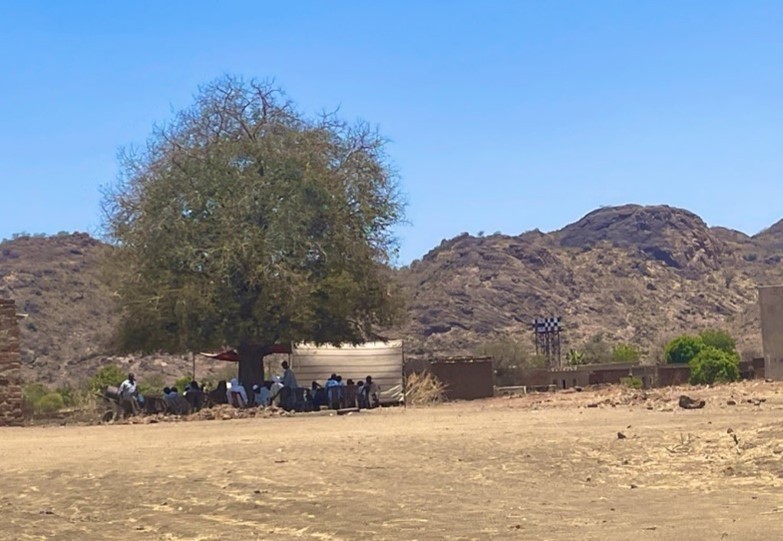
A soldier of the Sudanese Armed Forces died in Khartoum. His funeral was held in his hometown in Kadugli.
In the South Kordofan State, which the central government sees as an outlying area and doesn’t have interests in development and investment, many choose to be a soldier because there are no big industries except for agriculture, livestock farming, and gold mining. Often, a call for new soldiers is put out, and half a year ago, an orientation for hundreds of new soldiers was held in a vacant area. Many people have big families, therefore, there are always young men who become soldiers to support the household. I have just heard that even a teacher who had participated in the supplemental school of JVC became a soldier of RSF and left Kadugli.
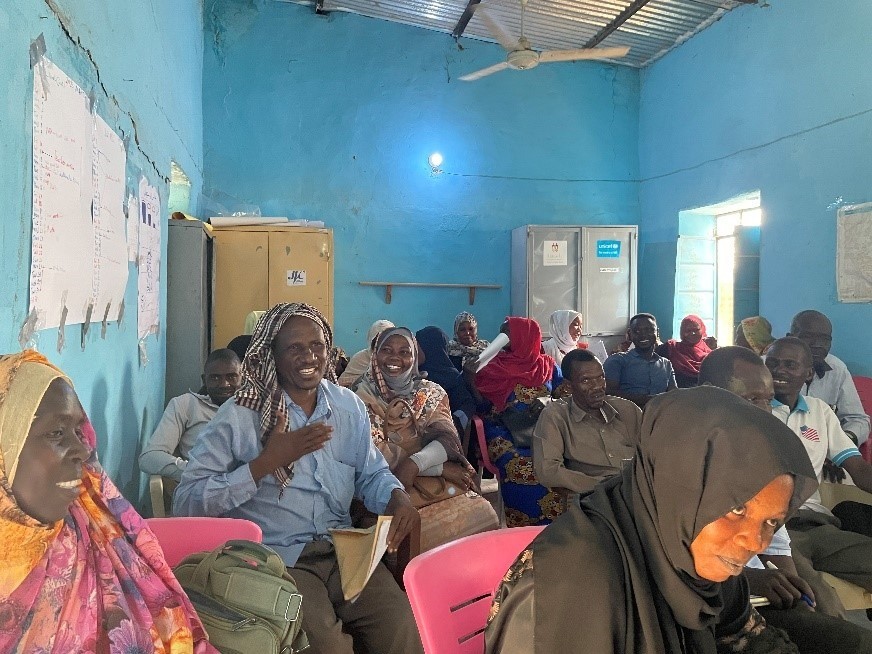
Teachers at the supplemental school gathered at the JVC’s office the next day after the breakout of conflict.
The conflicts are causing not only casualties but also adverse effects on daily livelihood.
In Kadugli, where there are no big factories, people basically depend upon the goods coming from Khartoum. Due to the battles, the roads that connect Khartoum and Kadugli were closed, and the flow of goods stopped. You can’t see any dairy products such as milk and yogurt at the markets and prices are soaring, especially the prices of sugar, oil, and onions which are indispensable for daily meals going up twice as much. On top of that, people are running out of cash because banks are closed. Wheat is scarce and bakery shops are crowded. Queues as long as a few hundred meters are in front of gas stations since there’s a limit of 8 liters for cars and 4 liters for rickshaws and tuk-tuks. People have to wait for several days to be able to get fuel.
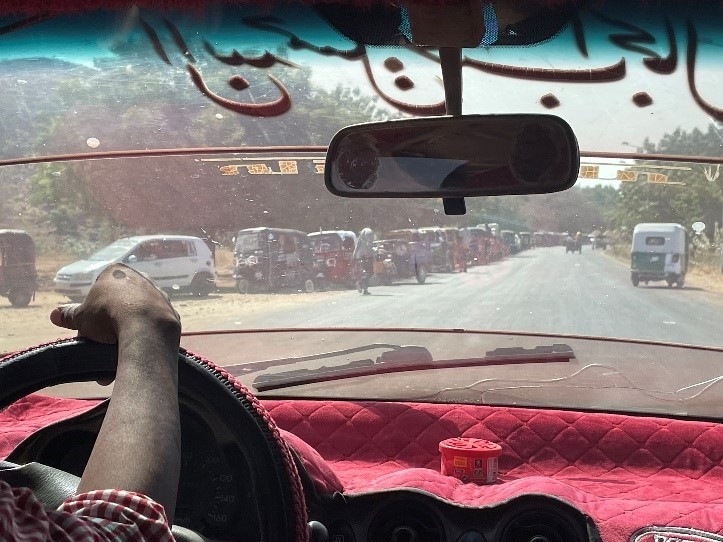
A long queue in front of a gas station
Voices of people in Kadugli, in the South Kordofan State
In this situation, what do ordinary people in Kadugli think about?
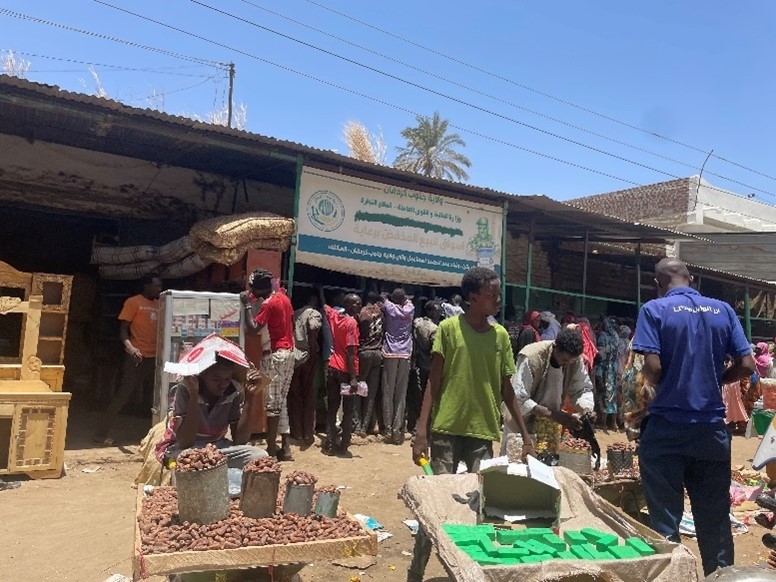
People standing in line for the bakery shop
“Sudan is the most beautiful country in Africa. Kadugli is especially abundant in nature. On top of that, people have a pure heart, even inviting strangers to eat dinner with them and stay at their homes. But politicians are the worst, and they always wage wars. Notably, Kadugli has a high rate of poverty and unemployment, which leads to many young men becoming soldiers. I don’t want to see blood. War destroys everything.”
This is said by Mr. Mubarak who has a builder’s office at the market.
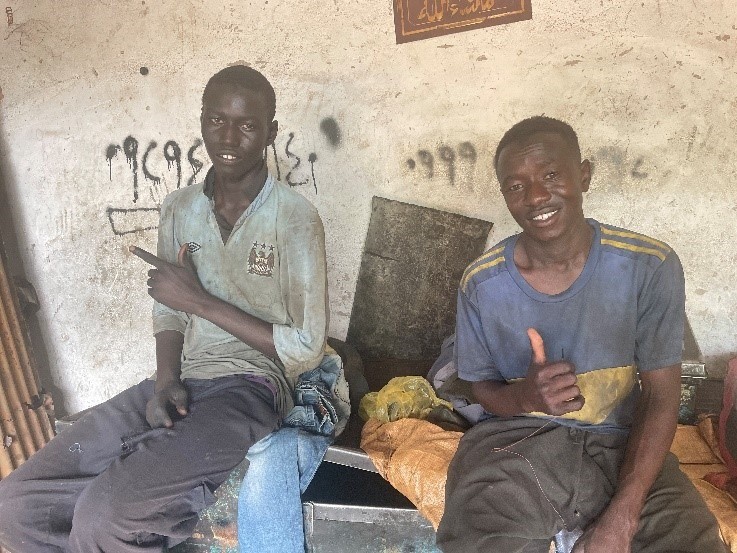
Mr. Musa (right) participated in the job training.
Mr. Musa (19 years old) participated in JVC’s job training instead of entering high school. He continues to work in the studio where he is dispatched after finishing the mechanic training for repairing rickshaws and tuk-tuks.
“Thanks to the income I get here, I not only help with my family budget but also with the payment of my brother’s and sister’s educational fees. Many of my friends became soldiers but I don’t want to be part of the war. I chose to become a mechanic. I will continue working and become a specialist and hopefully have my own studio. But after the conflicts began, there was no fuel arriving at Kadugli and fewer rickshaws and tuk-tuks were working. That means I have almost nothing to do. The only thing I can do is endure this situation.”
Although Mr. Musa feels satisfied with being able to support his family through his specific skill, the war affected him indirectly and negatively. Shortage of goods is slowing the economy down and aggravating people’s daily lives.
On the other hand, many people originally coming from the South Kordofan State had been affected by the war before and migrated and evacuated to the capital city. They experienced it again in the current war in Khartoum. This is a message from Mr. Haroun who has seven children.
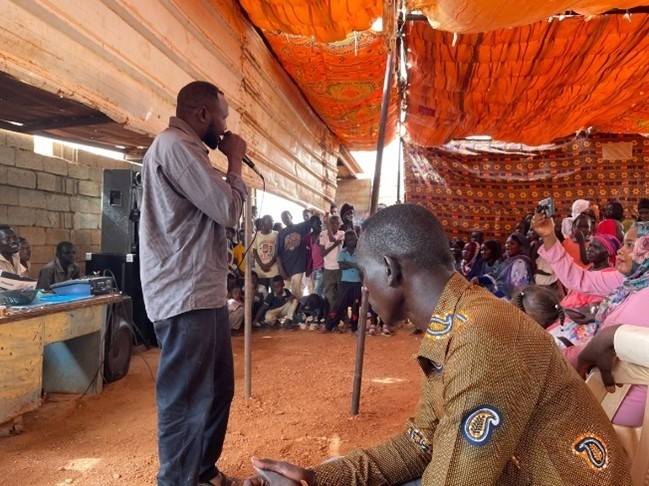
Mr. Haroun (left), a teacher in a poor district in Khartoum
“Electricity and water are available in my district, but food is scarce, so people have only one meal a day. I often buy new clothing during Eid-ul-Fitr, a festival at the end of Ramadan, but this year, I couldn’t. In this war, “winners” are “losers.” There are no winners in this war. Both the Sudanese Armed Forces and RSF recruit young Sudanese. One family has sent the children to both forces. It is reported, however, that recruiting is tribally biased and RSF has many mercenary soldiers from Chad and Niger. What is this war for, if you kill your brothers and win the war? It only gives you losses. Since the Mahdist War, this is the first time in a hundred years for Khartoum to become a battlefield. At that time, there was a clear reason to object to the English rule. But now they fight for nothing. Nobody wants this war. We, ordinary people, cannot stop this war that was waged by the upper ranks of the military. But the current priority is to stop this war. I hope that the international community and the United Nations will mediate and stop this war. We will do whatever we can do. The worst victims are children. The final examinations were planned to be held after the Eid-ul-Fitr festival, but the current situation does not allow them to take the exams, and no one is certain about the future. What if they lose the opportunity to be educated?” He spoke for dozens of minutes until his limited battery charge ran out.
“If you are in Kadugli now, don’t forget to bring me sorghum when you come back to Khartoum,” said Mr. Haroun, who always tries to break the tension with a joke. But his feelings are earnest. I just got a message from him. “We’re really in distress.”
Sudanese characteristics appearing during the conflicts
Since the outbreak of the battle, I received so many telephone calls and messages from my Sudanese friends. “Don’t go outside because fighting is taking place.” “Don’t come back to Khartoum now.” “Where are you now? I’m worried about you.” “My kids watched the news of the evacuation of the Japanese and asked me ‘Isn’t he coming back to Sudan forever?’” “You should leave Sudan as soon as possible and please come back when the situation becomes safe.” “If he goes back to Japan, there will be no Zain (Sudanese telecommunication network). How can I communicate with Kou?” They contact me even in their severe circumstances. A taxi driver whose taxi I only rode once in Port Sudan, which I visited during my trip two years ago, called me saying “I thought you were in Khartoum, so I was worried about you.” I was so touched and almost burst into tears.
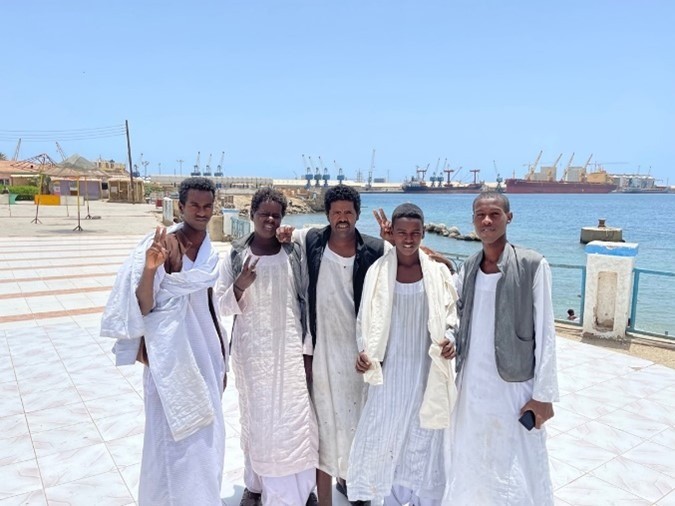
Near Port Sudan which I visited before
Khartoum has turned into a battlefield where there are continuous heavy military clashes and air strikes. Not only banks, factories, offices of international institutions, and NGOs but also ordinary homes are looted, and not only foreigners staying in Sudan but also nearly a million Sudanese are evacuating to neighboring countries (Egypt, Ethiopia, Chad, South Sudan) or the countryside. For those who were moving on cars and buses, villagers were seen to provide them with water, juice, bread, fruits, and sweets in various locations for free. They even invited them to their houses and offered overnight stays and frequent posts were made on social media about lending their vacant rooms. On the other hand, however, fees for bus rides and transportation are rising and, in some districts, even ten times more than the normal amount. I would like to convey that only rich people can move out and some cannot evacuate because they have elderly or sick people with them, and that tens of thousands of Syrians and Eritreans who live in Sudan far away from their home countries have no place to evacuate.
The situation of the JVC’s Kadugli office, one month after the start of the conflict
It is very difficult to predict what the situation in Sudan will be like down the road, but JVC staff members are continuing to work in Kadugli where the situation has been calm while giving full consideration to the situation. With communication far from perfect, banks not functioning, we couldn’t pay our staff’s salaries. But just one month after the outbreak of the fighting, we were able to pull out money from the bank. Mr. Ismeil, a team leader, never gives up, even though he shows concern over the situation. He says “War destroys everything and closes the door to development. But we will continue to do what we can do.” There is less attention in the media after most Japanese people have safely evacuated. But I will be grateful if those who have read this report will continue to pay attention to the situation in Sudan and support those who are working in the field and those struggling in the conflict.
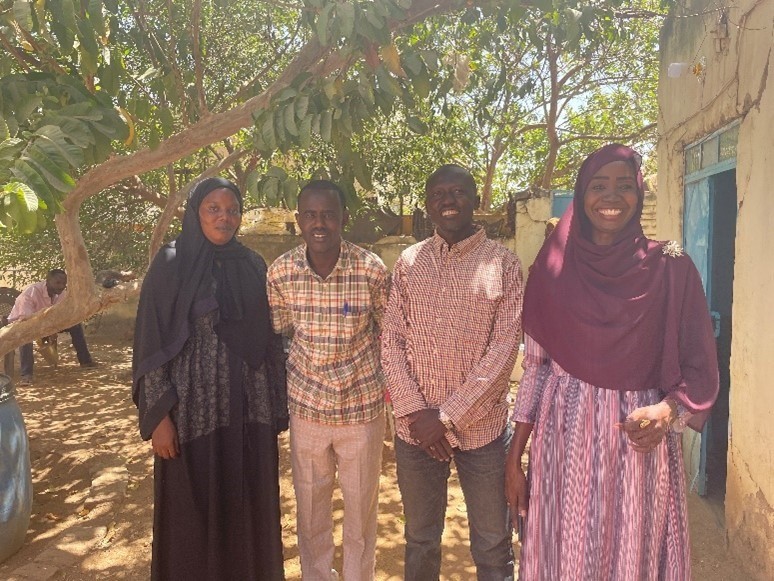
A group photo of the Sudanese staff at the Kadugli office taken before the Eid-ul-Fitr. The team leader Mr. Ismeil is second from the right.
